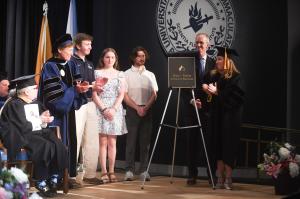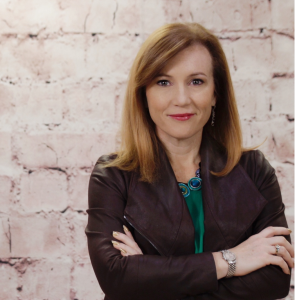IMMACULATA UNIVERSITY LAUNCHES MAJOR-PAYTON SCHOOL OF BUSINESS
Theresa Major Payton ’89 and Chris Payton Inspire Future Leaders with Immaculata’s New Business School
Formally announced on May 18 after Major-Payton’s address at Immaculata’s 101st commencement ceremony, the Major-Payton School of Business will house the University’s undergraduate and graduate business and leadership programs.
“Graduates of the Major-Payton School of Business will shine as bold, engaging, resilient professionals who are ready to add value to their organizations from day one,” stated Major-Payton, an Immaculata Board of Trustees member and prominent cybersecurity expert, author and business leader. "It all started at Immaculata, and the opportunity to give back in this significant way is a dream come true."
She will actively shape the business school's vision, including focusing on emerging fields such as cybersecurity, artificial intelligence, and global trade and reinforcing Immaculata’s commitment to preparing ethical, forward-thinking leaders. She will also collaborate closely with Immaculata's president, faculty and IHM Sisters to reflect the University’s mission.
“Theresa has always been an excellent example of the industry leaders that Immaculata produces, and she truly embodies our mission,” stated Immaculata President Barbara Lettiere. “Through the generosity, knowledge and leadership of Theresa and Chris, we are strengthening our commitment to our students and to their future employers by building excellent, workforce-prepared business professionals.”
About Theresa Major Payton and Chris Payton
Theresa Major Payton graduated from Immaculata in 1989 with a double major in economics and business, along with certificates in computers and business management. She was the first woman to serve as White House chief information officer, overseeing IT operations for President George W. Bush and 3,000 staff members from 2006 to 2008. Prior to that, she held executive roles in banking technology at Bank of America and Wells Fargo.
She is the founder, president and CEO of cybersecurity consulting firm Fortalice Solutions, LLC and also co-founded Dark Cubed, a cybersecurity product that was sold to Celerium. Fortalice was named an Inc. Magazine Power Partner and is recognized as one of the most innovative cybersecurity firms in the D.C.-Maryland-Virginia region. In 2020, CISO MAG named Payton Cybersecurity Crusader of the Year.
A best-selling author and public speaker, Payton appeared on the 2017 CBS reality show “Hunted” and frequently contributes to national news programs, including NBC’s “Today,” ABC’s “Good Morning America,” Fox Business, CBS Evening News, CNN, MSNBC and international outlets. She is also a member of Immaculata’s Board of Trustees.
Chris Payton initially began his career as a surface warfare officer with the U.S. Navy. He has an extensive background in talent acquisition, training, and development and is a certified six sigma Black Belt. After serving in the U.S. Navy, Chris has led global human resources and security teams within Bank of America and Wells Fargo, including as the head of global talent acquisition, chief learning officer, and corporate security executive at Bank of America and currently as the global talent acquisition operations executive at Wells Fargo.
Chris, Theresa and their three children live near Charlotte, N.C.
About Immaculata University
Immaculata University is a comprehensive, co-ed institution of higher learning that has emphasized academic success, student outcomes and faith-based values for more than 100 years. Offering more than 75 in-demand undergraduate, graduate and certificate programs, Immaculata University provides an excellent education, personal support and meaningful career pathways to tomorrow’s leaders who are focused on intellectual, personal, professional and spiritual growth. Immaculata’s expansive suburban campus is located in Chester County, Pennsylvania, 30 miles west of Philadelphia.
Lydia
Szyjka
+1 484-323-3973
email us here
Legal Disclaimer:
EIN Presswire provides this news content "as is" without warranty of any kind. We do not accept any responsibility or liability for the accuracy, content, images, videos, licenses, completeness, legality, or reliability of the information contained in this article. If you have any complaints or copyright issues related to this article, kindly contact the author above.
Global Advanced Process Control (APC) Market Insight, Growth, Industry Trends | Reports and Data
Gas Engine Market to Grow at 3.8% CAGR, Reaching $6.0 Bn by 2031
New Music Alert Gospel Rock Artist Rikki Doolan Releases Anthemic Single You Got Somebody
Więcej ważnych informacji
 Jedynka Newserii
Jedynka Newserii

 Jedynka Newserii
Jedynka Newserii

Konsument

Polacy nie korzystają z hossy trwającej na warszawskiej giełdzie. Na wzrostach zarabiają głównie inwestorzy zagraniczni
Od października 2022 roku na rynkach akcji trwa hossa, nie omija ona także warszawskiej giełdy. Mimo to inwestorzy indywidualni odpowiadają zaledwie za kilkanaście procent inwestycji, a o wzrostach decyduje i na nich zarabia głównie kapitał z zagranicy. Widać to również po napływach i odpływach do i z funduszy inwestycyjnych. Zdaniem Tomasza Koraba, prezesa EQUES Investment TFI, do przekonania Polaków do inwestowania na rodzimej giełdzie potrzeba zysków z akcji, informacji o tych zyskach docierającej do konsumentów oraz czasu.
Polityka
Obowiązek zapełniania magazynów gazu w UE przed sezonem zimowym ma zapewnić bezpieczeństwo dostaw. Wpłynie też na stabilizację cen

Unia Europejska przedłuży przepisy z 2022 roku dotyczące magazynowania gazu. Będą one obowiązywać do końca 2027 roku. Zobowiązują one państwa członkowskie do osiągnięcia określonego poziomu zapełnienia magazynów gazu przed sezonem zimowym. Magazyny gazu pokrywają 30 proc. zapotrzebowania Unii Europejskiej na niego w miesiącach zimowych. Nowe unijne przepisy mają zapewnić stabilne i przystępne cenowo dostawy.
Infrastruktura
Gminy zwlekają z uchwaleniem planów ogólnych zagospodarowania przestrzennego. Może to spowodować przesunięcie terminu ich wejścia w życie

Reforma systemu planowania i zagospodarowania przestrzennego rozpoczęła się we wrześniu 2023 roku wraz z wejściem w życie większości przepisów nowelizacji ustawy z 27 marca 2003 roku. Uwzględniono w niej plany ogólne gminy (POG) – nowe dokumenty planistyczne, za których przygotowanie mają odpowiadać samorządy. Rada Ministrów w kwietniu br. uchwaliła jednak ustawę o zmianie ustawy z 7 lipca 2023 roku, a jej celem jest zmiana terminu obowiązywania studiów uwarunkowań i kierunków zagospodarowania przestrzennego gmin na 30 czerwca 2026 roku. Wskazana data może nie być ostateczna z uwagi na to, że żadna z gmin nie uchwaliła jeszcze POG.
Partner serwisu
Szkolenia

Akademia Newserii
Akademia Newserii to projekt, w ramach którego najlepsi polscy dziennikarze biznesowi, giełdowi oraz lifestylowi, a także szkoleniowcy z wieloletnim doświadczeniem dzielą się swoją wiedzą nt. pracy z mediami.










.gif)

 |
| |
| |
|